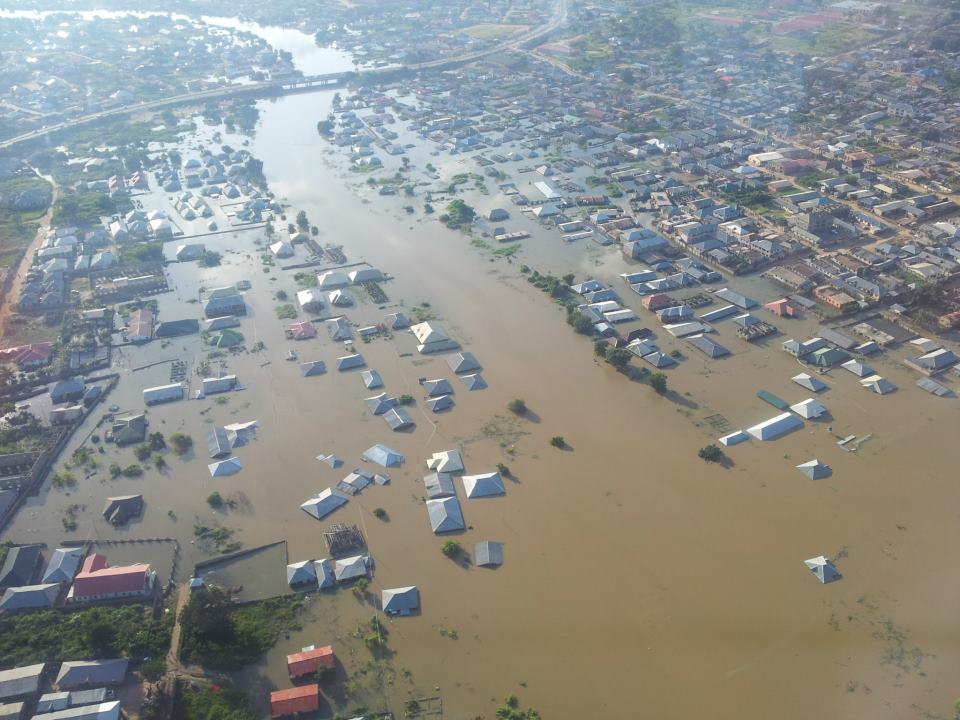The federal government has announced that as at yesterday, the death toll of flood disaster has hit 603. This comes as a report released by experts has warned that the agricultural losses recorded from recent flooding incidents will further worsen food scarcity.
Speaking in Abuja while giving updates on the flood situation at a press briefing, the minister of Humanitarian Affairs, Disaster Management and Social Development Hajiya Sadiya Umar Farouk disclosed that the total number of persons affected was over 2.5 million.
- 2023: Nasarawa police caution parties on electoral violence
- Gov Diri: Bayelsa govt house now under threat of flood
She said displaced persons affected were over 1.3 million people while the number of injured victims was 2,407, a total of 121,318 houses were partially damaged while 82, 053 were totally damaged.
The minister disclosed that 108,392 hectares of farmlands were partially destroyed while 332,327 hectares of farmlands were totally destroyed.
While expressing sadness over the recent boat mishap in Anambra State and other locations in the country, Farouk noted that the metrological agencies have warned that States like Anambra, Delta, Cross River, Rivers, and Bayelsa were still at risk of experiencing floods up till the end of November.
She, however, called on the respective state governments, LGAs, and communities to get prepared by evacuating people living on flood plains to high grounds, providing tents and relief materials, fresh water as well as medical supply for possible outbreaks of water borne diseases.
Farouk said that at the end of an emergency technical stakeholder meeting of all responsive agencies, it was resolved that although flood had become an annual disaster with devastating consequences and the effect of climate change makes it difficult to prevent in Nigeria, it could be mitigated and managed.
She said the meeting agreed to come up with a delegation to state governors to advocate for more commitment to strengthen their response mechanisms as stipulated in the National Flood Emergency Preparedness and Response Plan, noting that warnings and information were given to state governments on the 2022 flood situation but not heeded to.
She said stakeholders would work within their respective mandates to prevent deaths due to floods or other health-related diseases that come after floods.
“We must initiate a bilateral discussion with authorities in Cameroon next month (November 2022) on the periodic opening of the Lagdo dam. The delegation is to be led by the Permanent Secretary while the Ministry of Foreign Affairs will be requested to facilitate it.”
‘Food scarcity looms’
Meanwhile, a group of experts has warned of impending food and environmental crisis following excessive rain and ravaging flooding that affected 27 states and FCT, thus the need for proactive measures to curtail and manage the development.
This is contained in a report by the NexTier SPD, co-authored by Dr. Chukwuma Okoli, an Associate Consultant at NexTier SPD and a Lecturer, the Department of Political Science, Nnamdi Azikiwe University, Awka, Anambra State, and Dr. Ndu Nwokolo, a Managing Partner and Chief Executive at NexTier SPD and an Honorary Research Fellow, School of Government and Society, University of Birmingham, UK.
“The agricultural losses recorded from recent flooding incidents will further worsen food scarcity. For instance, Olam Farm, one of Nigeria’s largest contributors to the rice value chain, had its farmland of around 4,400 hectares in Nasarawa State completely submerged by excess water from the River Benue. This is a red flag for food scarcity.
“The release of excess water from the Lagdo dam in the neighbouring Republic of Cameroon contributed significantly to the current flooding across Nigeria. There is also a governance failure on the part of Nigeria for failing to complete the building of the Dasin Hausa Dam in Adamawa state as agreed by the two countries years back. The Nigerian dam is supposed to act as a buffer for excess water from the Lagdo dam,” the researchers said.
The report noted that states in Northern Nigeria were more prone to flooding, and have been the worst hit by the current floods. According to them, six northern states of Niger, Jigawa, Yobe, Kano, Katsin, and Kebbi accounted for 37 (35.9 percent) of the total 103 flood cases recorded in Nigeria between 2011 and 2020.

 Join Daily Trust WhatsApp Community For Quick Access To News and Happenings Around You.
Join Daily Trust WhatsApp Community For Quick Access To News and Happenings Around You.


